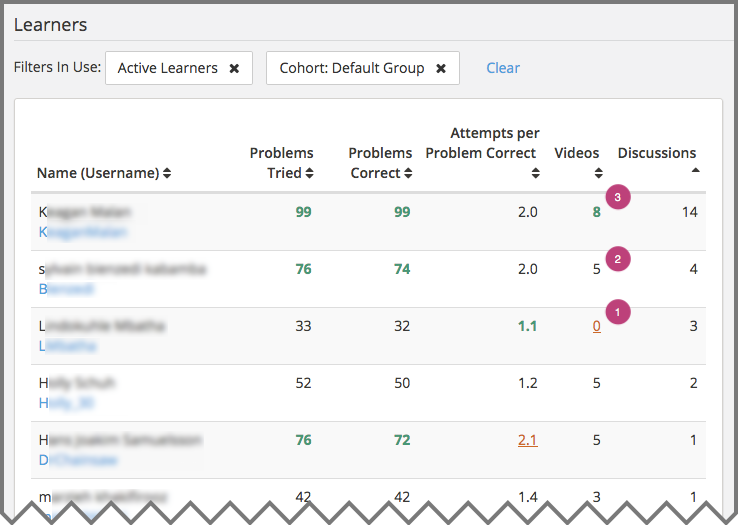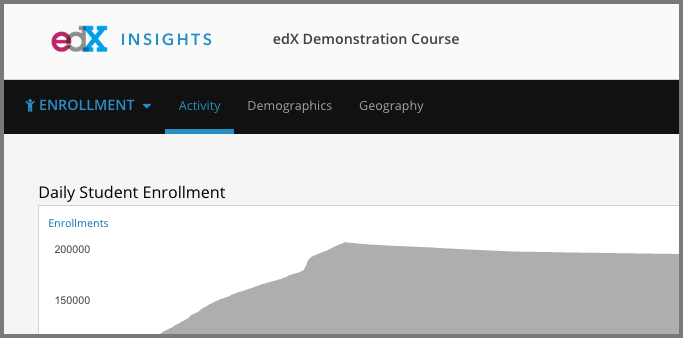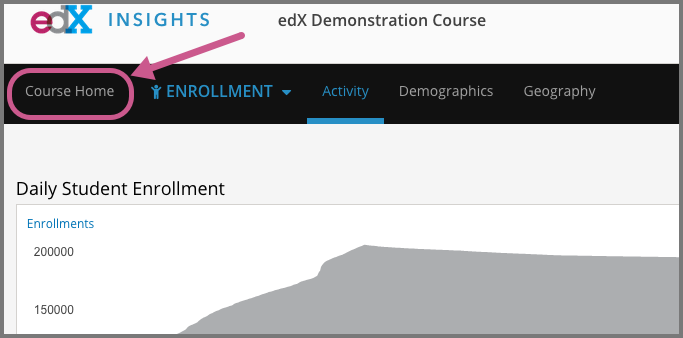EdX Analytics¶
The following information describes what is new in edX analytics.
- Week of 12 December 2016
- Week of 8 November 2016
- Week of 24 October 2016
- Week of 18 October 2016
- Week of 3 October 2016
- Week of 29 August 2016
- Week of 15 August 2016
- Week of 1 August 2016
- Week of 6 June 2016
- Week of 16 May 2016
- Week of 2 May 2016
- Week of 25 April 2016
- Week of 22 February 2016
- Week of 26 January 2016
- 16 December 2015
- 1 December 2015
- 27 October 2015
- 1 October 2015
- 28 July 2015
- 17 July 2015
- 8 July 2015
- 16 June 2015
- 10 June 2015
- 19 May 2015
- 22 April 2015
- 18 March 2015
- 11 March 2015
- 5 March 2015
- 23 February 2015
- 12 February 2015
- 28 January 2015
- 8 January 2015
Week of 12 December 2016¶
The following analytics events have been added to reflect course grading actions. For more information, see Grading-Related Events in the EdX Research Guide.
edx.grades.problem.submittededx.grades.problem.rescorededx.grades.problem.state_deletededx.grades.subsection.grade_calculatededx.grades.course.grade_calculated
Week of 8 November 2016¶
In Insights, the Weekly Student Engagement chart and the Content Engagement Breakdown report now include discussion participation counts for each week. Learners who added a post, a response, or a comment are included in this count. The “Participated in Discussions Last Week” metric reports the number of unique users who added a post, response, or comment to any course discussion topic in the last week, and also provides this value as a percentage of currently enrolled students.
For more information, see the Engagement Activity section in the Using edX Insights guide.
Week of 24 October 2016¶
For Insights, this release adds a Course Home link to the navigation bar on all course pages.
The navigation bar before the change:
The navigation bar after the change:
Two new SQL tables are now included in the data packages that edX prepares for partner organizations. These tables,
student_courseaccessroleanddjango_comment_client_role_users, contain data to identify the privilege levels, or roles, that individual users have for a course.student_courseaccessrolelists the users who have a privileged role or roles for working in a course.django_comment_client_role_usersidentifies the privilege role for working in course discussions for every user enrolled in a course.
For more information, see User Info and Learner Progress Data in the EdX Research Guide. (TNL-4154)
Week of 18 October 2016¶
In Insights, an internationalization issue that prevented users of certain languages from loading graphs or tables has been resolved.
Week of 3 October 2016¶
- Insights now uses the edX Pattern Library.
- Accessibility: title element updates on learner page change.
- Bug fix: Display correct sort arrow direction on learner roster table load.
- Bug fix: An issue with internationalization prevented users of certain languages from loading graphs or tables.
- Add support for a Download CSV button to the learner roster. This feature is disabled by default on all installations, including edx.org.
- Add support for a Problem Response Report Download button to the course home page. This feature is disabled by default on all installations, including edx.org.
- Updates to third-party libraries and other minor bug fixes.
Week of 29 August 2016¶
Individual Learner Data in Insights¶
Data for individual learners is now available in edX Insights. Activity metrics for the past week, including the number of videos viewed, discussion contributions made, and problems attempted, are now available for every enrolled learner.
The learner roster and key activity report shows how learners are doing in relation to their peers. In the example learner roster and key activity report below, the numbered callouts illustrate the color and font cues that identify a percentile range for each metric.

- Counts that are underlined and in red are in the 15th percentile or below, and might indicate that a learner is falling behind.
- Counts in the 16th-84th percentiles appear in normal black font.
- Counts in the 85th percentile or above appear in bold, green font, and might indicate that a learner is doing particularly well.
Select any learner’s username in the learner roster and key activity report to open a chart and review a timeline of that learner’s daily activity throughout the course.

For more information, see Individual Learners in the Using edX Insights guide.
Research Data Exchange Program¶
The research data exchange (RDX) program provides a way for edX charter member organizations to access data for courses run by other participating organizations. Through this program, obfuscated data is made available to research teams who are conducting approved educational research studies.
For more information about RDX, including how organizations can apply to participate and how researchers can request data for a study, see the Research page on the edX partner portal.
For more information about how to access RDX data packages and how the data is obfuscated, see the Research Data Exchange section in the EdX Research Guide.
Week of 15 August 2016¶
- In Insights, all dates are now reported in Coordinated Universal Time (UTC). Previously, time zone differences could cause apparent discrepancies between the dates used by tooltips, charts, tables, and .csv downloads. (AN-5991)
- In Insights, all x-axis labels for dates now include the year value and appear in DD Mon YYYY format. (AN-4035)
Week of 1 August 2016¶
In Insights, the Daily Student Enrollment chart and the Enrollment Over Time report now include counts for each of the enrollment options and tracks that are offered for your course. Specifically, enrollment graphs now show audit track enrollments separately from honor track enrollments, which are no longer offered. Because of this change, enrollment options and tracks for courses that run after December 2015 can include audit, verified, verified with credit, and professional. Enrollment tracks for courses that ended before December 2015 might also include honor.
For more information, see the Enrollment Activity section in the Using edX Insights guide.
Week of 6 June 2016¶
The following analytics events have been added to reflect course navigation actions in the LMS. For more information, see Course Navigation Events.
edx.ui.lms.sequence.next_selectededx.ui.lms.sequence.previous_selectededx.ui.lms.sequence.tab_selectededx.ui.lms.outline.selectededx.ui.lms.link_clicked
Week of 16 May 2016¶
An error that prevented the metadata:discussion_id field from being
included for discussion course components in the
{org}-{course}-{date}-course_structure-{site}-analytics.json JSON file has
been corrected. (AN-6696, PLAT-1029)
Week of 2 May 2016¶
In Dec 2015 and Jan 2016, edX added several accessibility enhancements to the video player’s controls. This release includes the following updates to the events that the video player emits. (AC-383, AC-385, and AC-444)
- The button that shows or hides a transcript file on the right of the video
was relabeled from CC to
". The video player emits the existingshow_transcript/edx.video.transcript.shownandhide_transcript/edx.video.transcript.hiddenevents when users interact with this control. - A button, labeled CC, was added to show or hide closed captions, which are
overlaid on the video while it plays. The video player emits new events,
edx.video.closed_captions.shownandedx.video.closed_captions.hidden, when users interact with this control. - A menu for selecting a different language for the transcript and closed
captions was added. The video player emits the existing
video_hide_cc_menuandvideo_show_cc_menuwhen users interact with this control. In addition, these events now includenamevalues ofedx.video.language_menu.hiddenandedx.video.language_menu.shown, respectively, and thevideo_hide_cc_menu/edx.video.language_menu.hiddenevents include a neweventmember field,language.
For more information, see Video Interaction Events.
Week of 25 April 2016¶
With the release of the drag and drop problem XBlock, five new events have
been added to data packages. Among these events are
edx.drag_and_drop_v2.item.picked_up and
edx.drag_and_drop_v2.item.dropped. For more information, see
Drag and Drop Events in the EdX Research Guide.
Week of 22 February 2016¶
With the release of the notes feature, seven new events have been added to data
packages. Among these events are edx.course.student_notes.added,
edx.course.student_notes.edited, and
edx.course.student_notes.used_unit_link.
Update 25 Feb 2016 This feature is not yet available for courses running on the edx.org or edge.edx.org web sites.
Week of 26 January 2016¶
- A problem caused broswers to emit many
play_videoevents when a video was buffering. This problem has been fixed. (TNL-2178) - Events that identify when a peer instruction component is accessed, and when an initial answer or a final answer is submitted, have been added to course data packages. For more information, see Peer Instruction Events.
- The
audit_notpassingandaudit_passingstatuses have been added to thecertificates_generatedcertificatetable. For more information, see Columns in the certificates_generatedcertificate Table.
16 December 2015¶
The edX analytics data exporter now includes the following steps to increase the quality of data delivered in SQL tables to partner institutions.
- All embedded tabs, newlines, and carriage returns have been replaced by the
two-character sequences
\t,\n, and\r, respectively. - Values in timestamp fields now appear without trailing zeros. For example,
“2015-10-12 07:51:40.000000” now appear as “2015-10-12 07:51:40”. These
changes apply to all of the .sql files in edX data packages, with the
exception of data for the
courseware_studentmoduletable. - Backslash characters (
\) are now escaped as\\.
These changes affect data packages available beginning 13 Dec 2015.
- All embedded tabs, newlines, and carriage returns have been replaced by the
two-character sequences
SQL tables of data for open response assessment (ORA) problems are now included in an
orasubdirectory in the weekly database{org}-{date}.zipdata file. In addition, thestudent_anonymoususeridSQL table, which is necessary for interpreting this data, is also included in the weekly database data file.These tables are included in data packages available beginning 13 Dec 2015. For more information, see the Open Response Assessment Data section in the EdX Research Guide.
1 December 2015¶
The following events are now emitted when learners interact with mixes created from PowerPoint presentations using Office Mix.
microsoft.office.mix.loadedmicrosoft.office.mix.pausedmicrosoft.office.mix.playedmicrosoft.office.mix.slide.loadedmicrosoft.office.mix.stopped
For more information about these events, see Third-Party Content Events in the EdX Research Guide.
For more information about how course teams can add mixes to their courses, see Office Mix Tool in Building and Running an edX Course or Office Mix Tool in Building and Running an Open edX Course.
The following events are now emitted to record the votes that users make on discussion posts and responses.
edx.forum.response.votededx.forum.thread.voted
For more information about these events, see Discussion Forum Events in the EdX Research Guide.
27 October 2015¶
The following events are now emitted when learners interact with Oppia explorations.
oppia.exploration.loadedoppia.exploration.state.changedoppia.exploration.completed
For more information about these events, see Third-Party Content Events in the EdX Research Guide.
1 October 2015¶
A course team member can now use the Enrollment API to find out which of his or her courses a particular learner is enrolled in. For more information, see Enrollment API Version 1.0. (OSPR-754)
28 July 2015¶
Instructor Dashboard Analytics Replaced by edX Insights¶
Information on the Analytics tab of the Instructor Dashboard has been replaced by a link to edX Insights. EdX Insights includes all data analytics for your course. For more information, see Overview.
17 July 2015¶
When a learner who was watching a video moved the video playhead forward in
the video playbar, the play_video event that was emitted contained the old
time of the play position, rather than the new time where the learner resumed
playing. This issue has been fixed. (TNL-2165)
For more information about video events, see Video Interaction Events in the EdX Research Guide.
8 July 2015¶
The following events are now emitted when learners interact with polls and surveys.
xblock.poll.submittedxblock.poll.view_resultsxblock.survey.submittedxblock.survey.view_results
For more information about these events, see Poll and Survey Events in the EdX Research Guide.
16 June 2015¶
For YouTube videos, the pause_video event was not emitted before the
stop_video event when a video ended. This issue is resolved. Both events
are now correctly emitted when a video ends. (TNL-2167) For details, see the
Video Interaction Events section in the EdX Research Guide.
10 June 2015¶
The edX Platform emits events for user interactions with a course pre-roll video. The pre-roll video interaction events are distinct from the events emitted for interactions with videos in the courseware.
For more information, see Pre-Roll Video Interaction Events in the EdX Research Guide.
19 May 2015¶
Two instructor events have been added for generating and downloading reports from the Instructor Dashboard.
22 April 2015¶
With the release of the Profiles feature, the information in course data
packages will change. The auth_userprofile table includes two new columns,
bio and profile_image_uploaded_at. Additionally, data packages will
include a new student_languageproficiency table. For more information, see
the User Info and Learner Progress Data section in the edX Research
Guide.
18 March 2015¶
Daily data packages now include events that record which of the problems in a library were delivered by a randomized content block component. For more information, see the Events in the Tracking Logs section in the edX Research Guide.
11 March 2015¶
The tracking logs in daily data packages now include additional events for actions completed using the edX mobile app.
- The edX mobile app for iOS now emits
play_video,pause_video,stop_video,load_video, andseek_videoevents. - The edX mobile app for Android now emits
seek_videoevents in addition to other video interaction events.
For more information, see the Video Interaction Events section of the edX Research Guide.
5 March 2015¶
- Data packages now include the following events. For more information, see the
Events in the Tracking Logs chapter in the edX Research Guide.
- Events that record when learners view the contents of a Google Calendar or Google Drive component in the LMS.
- Events that record new posts, responses, and comments in course discussions.
23 February 2015¶
Events in the data package now include data from two HTTP header fields,
referer and accept_language.
12 February 2015¶
The context field for server events now provides a usage_key to
identify XBlock content. The usage_key member field was added to the
module dictionary, which also provides the component display_name, on
28 Jan 2015.
For more information, see the Events in the Tracking Logs section in the edX Research Guide.
28 January 2015¶
Data packages now include a .csv file of the email preference that each learner supplies when they enroll in your institution’s courses on edx.org. The file includes data collected across all of an institution’s edx.org courses. For more information, see Email Opt In Report in the edX Research Guide.
8 January 2015¶
- In early November 2014, an error was introduced that prevented events from being generated for open assessment problems. This error has been corrected.
- Also see mobile updates for 8 January 2015.

